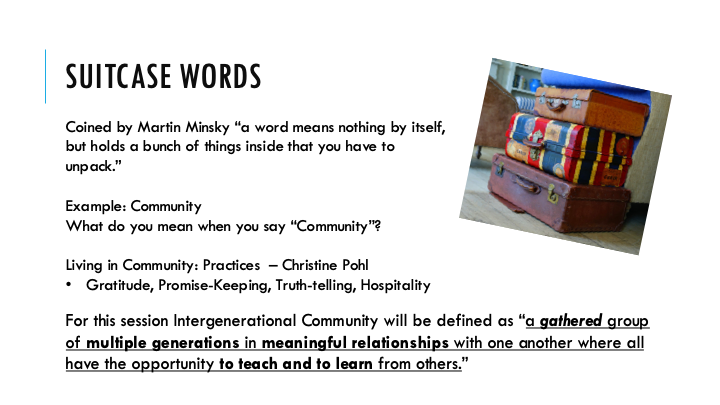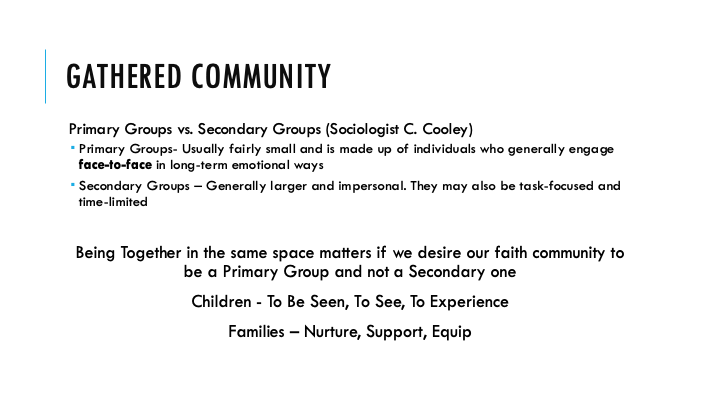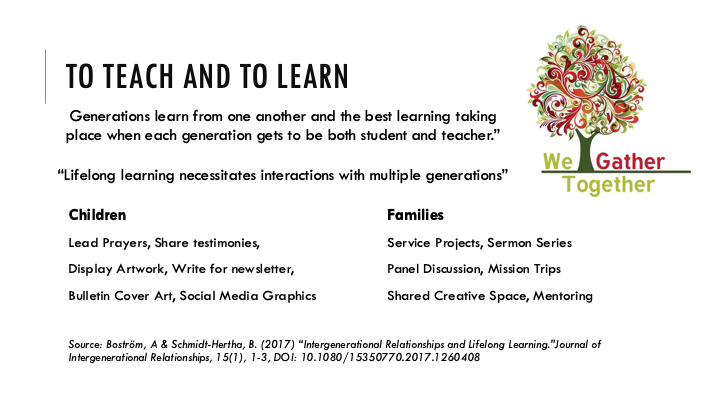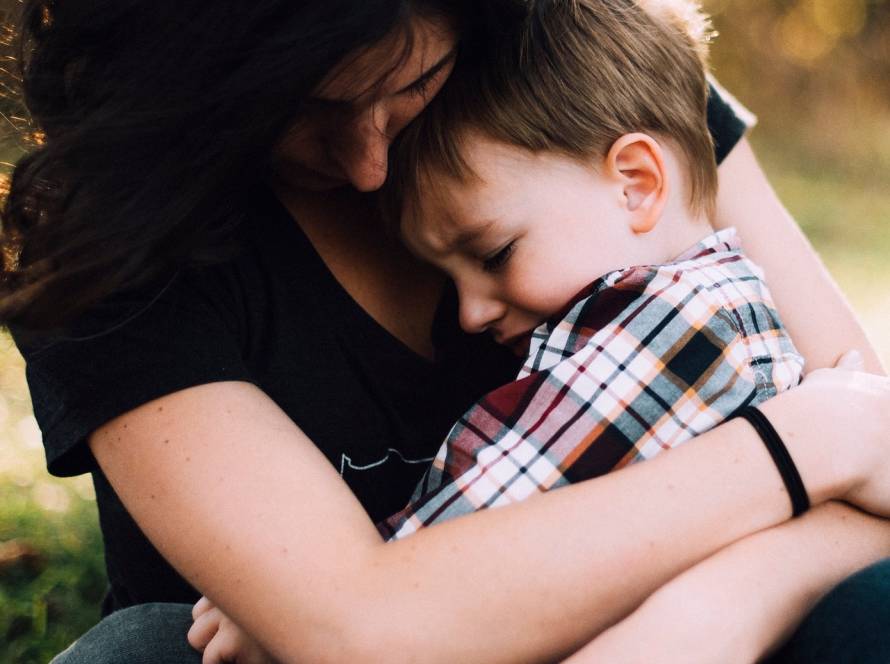This week I had the chance to join with around 400 people via Zoom at Intergenerate Australia. It was a phenomenal time of growing and learning with people all over the world and I’m so grateful for what was shared there. A few people have asked for slides from my presentation so I thought I’d do a recap here along with sources/resources used so we can keep the conversation going!
Intergenerational Community… what exactly does that mean?

When we talk about certain things, like community, we bring to the conversation all the defining characteristics of that thing that we’ve gained over our years. Martin Minsky calls these words “suitcase words“; words that need unpacked because they carry a lot of meaning.
For example the word, “Community” means different things to different people. Because I am in the process of reading Living into Community: Cultivating Practices that Sustain Us by Christine Pohl, I now include the practices of gratitude, promise-keeping, truth-telling and hospitality in my definition of community. But people who haven’t read this book may not have all of those meanings in their “suitcase.”
It’s important to define what you are talking about before you starting talking about it so, for this blog post, the term “intergenerational community” will be defined as:
A gathered group of multiple generations in meaningful relationships with one another where all have the opportunity to teach and to learn from others.”
Now that’s not to say this definition is the “right” definition or the “only” definition; it’s just the one we are going to use for the purpose of this post.

When sociologists talk about groups that gather together in community, they often talk about primary groups (more intimate, face-to-face, long-term) and secondary groups (impersonal, task-focused, time-limited). Our goal in establishing intergenerational community is for the church to be a primary group not a secondary one. Our gathering can’t just be to fulfill the tasks involved in having a Sunday morning service, limited to an hour, and segregated by age. If our faith community is to be a primary group which wields the most influence, we need to be together in the same space, face-to-face, in meaningful ways.
To explore the importance of this for children, click here. For parents, click here.

When we talk about a space being intergenerational, we want that place to be representative of the generations that are in our community. That doesn’t mean every generation will be present at every event. But that also doesn’t mean the majority of the people present will be one generation with a single representative of another (think Sunday School classroom).
A good rule of thumb: When thinking about intergenerational community, think “Past, Present, Future.” Three generations – one who represents the past (older generation), one who represents the present (middle generation), and one who represents the future (youngest generation).
There has been much research done on the importance of intergenerational relationships for all generations. For more on this for children, click here and for families/parents, click here.

It is not enough to simply gather multiple generations into a space and call it community. There must be the cultivation of meaningful relationships, a deeper meeting of spirits and a connecting to one another’s humanity. This can often be done in very practical and simple ways if we are willing to get creative.
Resist the urge to “programmatize” relationship. That never works out well. Instead, find ways to provide opportunities both in the church building and outside of the church building for meaningful relationships to form. There are some ideas listed above on the slide and below are some links for further exploration.
- Pray for Me Campaign – Connect kids and youth to muligenerational prayer partners
- Practical Tips and Tools for Intergenerational Worship
- Family Worship Experiences

The final part of creating an intergenerational community for children and families is to provide a space for all generations to be both teacher and student. If a church finds that it is consistently having only one generation act as the “teaching” generation and all others are in learning mode, lifelong learning is unlikely to be fostered. Each generation has unique gifts and worldviews to add to the conversation. Strive to find space for each to teach and each to learn.
Each of these elements (gathered community, multiple generations, meaningful relationships, learning/teaching) taken singularly leaves an important part of intergenerational community out. If a church nails gathered community but doesn’t foster meaningful relationships, the next generation has very little to bring them back when they are older. If a church knocks teaching and learning out fo the park but limits generational involvement, then community will suffer from a lack of full participation.
Taken together however, these pieces of the puzzle can help lead to a rich and growing intergenerational community that extends beyond Sunday morning and into everyday life. And that is the key to true community; it has to be more than an event – it needs to be who we are, the church, the body of Christ.
(For those of you looking for the chart used during breakout discussion groups, go here)
For more information about
- Kids in Worship
- Determining which Type of Family Ministry model works best for your church
- Discipleship in Intergenerational community
- Encouraging the continued conversation through Practical Discipleship at Home
- Seminars, Workshops, Coaching
Check out to ReFocus Ministry or “like” our Facebook page. Join our conversation at theReFocus Family and Intergen Ministry group on Facebook.
About this Blog

Refocus Ministry was started by Christina Embree, wife to Pastor Luke, mom to three wonderful kids, and church planter at Plowshares BIC. She also serves as the Minister of Generational Discipleship with the Great Lakes Conference of the Brethren in Christ.
With years of experience in family ministry and children’s ministry, she is passionate about seeing churches partnering with families to encourage faith formation at home and equipping parents to disciple their kids in the faith. She recently graduated with a Masters of Arts in Ministry focusing on Family, Youth and Children’s Ministry at Wesley Seminary, she also blogs at www.refocusministry.org and is a contributing blogger at D6 Family, ChurchLeaders.com, and Seedbed
*The advertisements on this page are chosen by WordPress, not by ReFocus Ministry, and do not necessarily reflect the opinions and values of the author.


